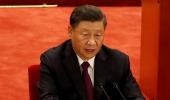'Both have a very nationalistic view of foreign policy.'
'They think they are shrewd and clever diplomats.'

"Xi Jinping is very strong-minded, thoroughly in-charge and very magisterial. He has great confidence in his own perspective. Likewise, Mr Modi has very strong views and is convinced that he can get things right on his own," Dr Kanti Bajpai, author of the fascinating new book India Versus China: Why They Are Not Friends, tells Rediff.com's Archana Masih in part 3 of a revealing interview.
- Part I: Could India be heading for a short war with China?
- Part II: 'China will continue to be bossy'
Two former foreign secretaries Shyam Saran and Shivshankar Menon have pointed out that Beijing's attitude towards Delhi changed around 2008, three years after India's nuclear agreement with the United States.
Do you think the India-US nuclear treaty was the so-called point of no return for India-China relations?
Is the India-US relationshi[ the bone in the throat of India-China relations?
That is broadly correct. India has grown closer to the United States and I would say this began much earlier than 2008.
The discussions after the nuclear tests of 1998 between Jaswant Singh and Strobe Talbot failed, but laid the groundwork for the 2005 agreement.
I would say 2005-2008 was the period when the Chinese felt that India was beginning to tilt too far the other way. They certainly got increasingly worried.
There were other factors too. Around that time the Chinese ambassador in Delhi made statements about Arunachal Pradesh, reminding India that China laid claim to all of Arunachal, not just little bits and pieces.
After that, by about 2008-2009-2010, India stopped acknowledging Tibet as a part of China. Prior to that, all joint statements with the Chinese said that Tibet was a part of China.
India dropped that reference because the Chinese were beginning to be more and more obstreperous about Arunachal Pradesh.
Just as in India, the different schools of thought in China have taken a measured view of India's relationship with the US.
They count on the fact that India has always been non-aligned and doesn't like to be a junior partner. They don't exaggerate the closeness of India to the United States and are aware that their own actions can push India closer to the US.
I would agree with Shyam Saran and Shivshankar Menon that the Chinese watch India's relationship with America closely. But I think, they would probably agree that there are other bilateral factors, such as Tibet and the power gap that has also made the Chinese more difficult to deal with.
The current External Affairs Minister S Jaishankar has asserted that India-China relations are at a crossroad.
Where do you see the road leading in the months to come? Or in the years ahead?
The months ahead are going to be more of the same. I don't see either side giving away very quickly which is quite evident from the breakdown in the talks and the slowing down of the withdrawals.
Secondly, it doesn't help that China feels under pressure from the Group of Seven and their statement that China is the biggest strategic threat.
India was an invitee to that meeting and hence is seen as a partner of the G7, led by the United States.
It is dialectical -- the Chinese are hard-nosed, so we get closer to the G7 and the Americans. When we get closer to the G7 and the Americans, the Chinese become more alarmed and hard-nosed.
There is no sign that we can break out of that dynamic. It is impossible for India to make any big moves or concessions at this point because we are economically weak.
We've had a terrible second wave of COVID-19. If the Indian government were to make any big concessions in the midst of an economic slowdown and a pandemic it would show that India is desperate to appease the Chinese.
I don't think Modi or Jaishankar would want to send that message to the Chinese at this point.
Likewise, the Chinese have a sort of coalition firming up against them. They don't want to send out any signs of weakness.
Either side is not in the mood to make any bold moves towards the other. They are preoccupied with other issues as well and not giving it central attention.
Thirdly, both Xi and Modi see themselves as very strong leaders. They both have a very nationalistic view of foreign policy. They both think that they are shrewd and clever diplomats.
In my view, both are not leaders who listen very much to other opinions.
Xi Jinping is very strong-minded, thoroughly in-charge and very magisterial. He has great confidence in his own perspective.
Likewise, I don't think anyone would accuse Mr Modi of being someone who listens too much to other people. He has very strong views and is convinced that he can get things right on his own.
Hence, one of the problems is that neither leader is prone to listen to other opinions.
I don't see any let up in the India China relationship at the moment for these reasons.
This brings us back to Tibet again. The Chinese are nervous about the status of Tibet and are not in the mood to be conciliatory to their neighbours, particularly India.
India has quite a difficult time ahead in dealing with China.

Prime Minister Modi invested a lot of personal equity in the relationship with Xi Jinping and China, only to be betrayed by a series of military standoffs.
Do you think the summits in Wuhan and Mahabalipuram were a wasted effort?
In international relations, the idea of betrayal is odd because countries do what they do to protect their interests.
The interlocutors must be aware that somebody's word or a summit really doesn't define what might or might not happen. You've got to keep your guard up.
On the Indian side, clearly, our intelligence was poor and we had no sense that something might be amiss.
If Indian intelligence provided the evidence, then someone up in the chain of decision making ignored it or did not think it was significant.
That's our own failure. If your intelligence fails, or if your decision making in the light of intelligence fails, then why talk about betrayal of the other side?
The Chinese could also make the case -- and I have heard from interlocutors that they feel 'betrayed' by Wuhan.
They felt India was committed to not getting so close to the United States; of taking a more relaxed view of Chinese intentions in East Asia, and not becoming such a big participant in the Indo Pacific and the Quad.
During his address at the Shangri La dialogue in Singapore in 2018, Modi addressed the issue of a free and open Indo-Pacific. He added a word that should have reassured the Chinese. He said free and open, but also inclusive. That China could join the Indo-Pacific as long as it adhered to the rules of shipping, maritime patrolling and freedom of the high seas.
But then, at the same time in Chinese eyes, India was flirting increasingly with Australia, Japan and the United States.
I think the Chinese could also say that despite what Modi said at Shangri La, the fact is that India has been getting closer to the Americans after 2018.
There are two sides to the story, but the broader problem is that India and China have concerns, perspectives, interests and the difficulties of last year give expression to that.
It's not just a matter of betrayal, it's a matter of different interests, perception, the power gap and an unsettled boundary.
On the boundary perspective, the two countries don't agree on anything. They don't agree on where the LAC (Line of Actual Control) goes, on what is included and how it can be solved. They don't agree on even the length of the boundary, the Chinese say it is 2,000 kilometres, India says it's nearly 4,000 kilometres.
It is not just a matter of Wuhan, Mamallapuram and betrayal. As I show in the book, it is about these four big issues -- perceptions, perimeters, partnerships, and power. We are very far apart on all.
Feature Presentation: Aslam Hunani/Rediff.com










